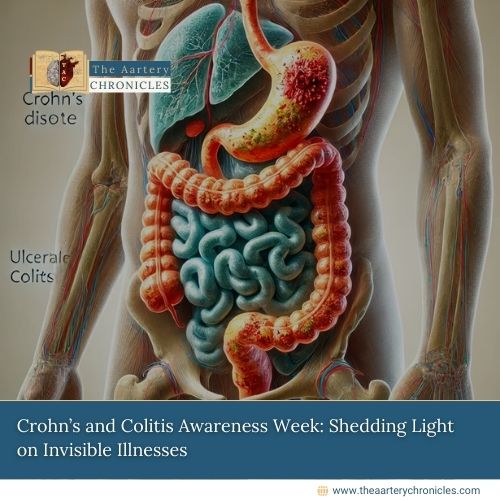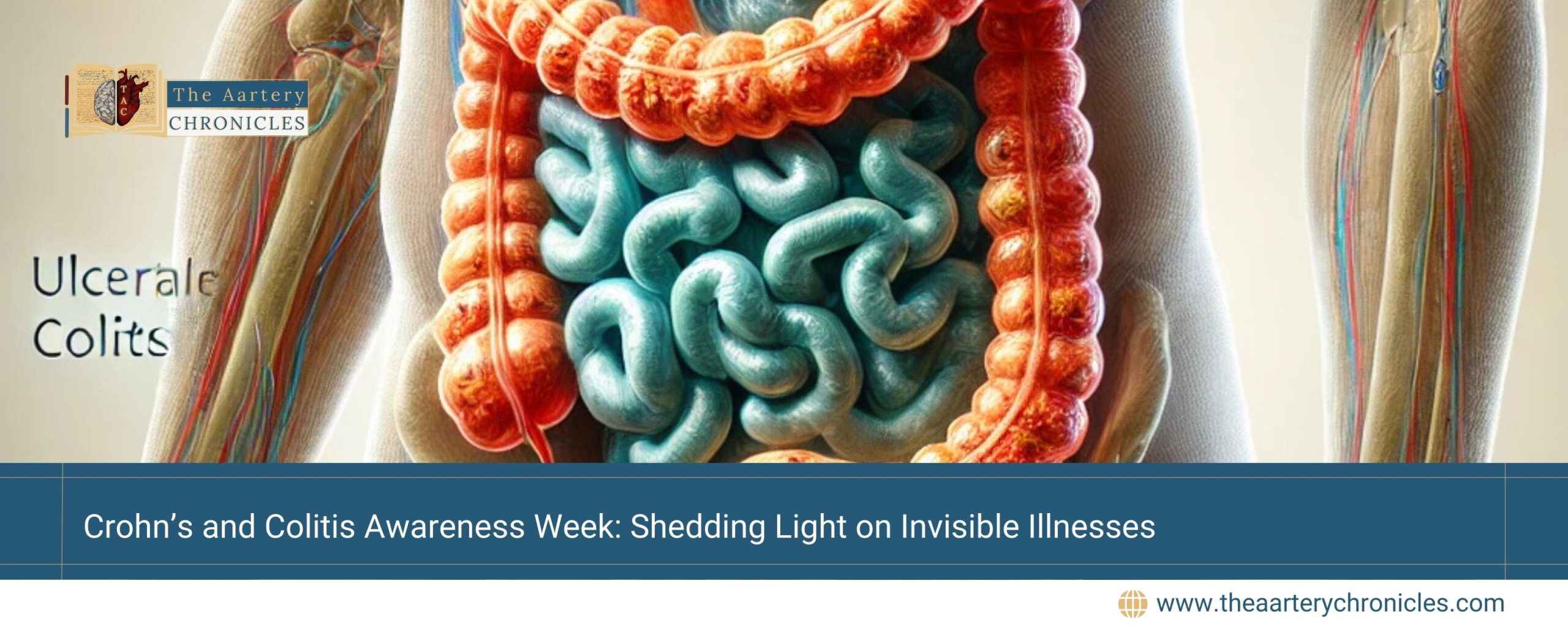

Crohn’s and Colitis Awareness Week: Shedding Light on Invisible Illnesses
Overview
Each year, Crohn’s and Colitis Awareness Week is observed from December 1 to December 7, spotlighting the daily challenges faced by individuals living with inflammatory bowel diseases (IBD). These conditions, encompassing Crohn’s disease and ulcerative colitis, affect millions globally, yet remain misunderstood and underrepresented in public health discussions. These chronic conditions cause inflammation in the gastrointestinal tract and significantly alter patients’ quality of life.
This week serves as an opportunity to educate, advocate, and provide support to those affected by these chronic illnesses.
What is Crohn’s Disease?
Crohn’s disease is an autoimmune condition that can cause inflammation in different parts of the GI tract, including the small intestine, colon, and sometimes even the stomach or oesophagus. It can lead to severe and distressing symptoms, alternating between phases of remission and flare-ups. During flare-ups, the inflammation can cause significant discomfort and complications, including:
- Abdominal pain and cramping
- Fatigue and general weakness
- Diarrhea
- Bloody stool
- Fever and reduced appetite
- Unintended weight loss
- Anemia and other nutritional deficiencies
In certain cases, patients may also experience symptoms beyond the intestines, such as fistulas, kidney stones, urinary tract infections (UTIs), colitic arthritis, and pericholangitis (inflammation of the tissues surrounding the bile ducts).
What is Ulcerative Colitis?
Ulcerative colitis (UC) is an inflammatory bowel disease (IBD) that primarily targets the colon (large intestine) and rectum, causing long-lasting inflammation and ulcers (sores) in the lining of the colon. Symptoms usually develop slowly over time instead of occurring suddenly. The symptoms of ulcerative colitis typically include:
- Diarrhea
- Abdominal pain and cramping
- Rectal pain and bleeding
- Urgent bowel movements
- Unintended weight loss
- Fatigue and fever
If left undiagnosed, the condition may result in complications such as significant dehydration, a perforated colon, anemia, bone loss (osteoporosis), rapid colon swelling (megacolon), and a heightened risk of colon cancer.
The Impact of IBD on Daily Life
Living with Crohn’s disease or ulcerative colitis can make everyday life unpredictable and challenging. The physical symptoms, such as pain, fatigue, and digestive discomfort during flare-ups, often disrupt daily activities and affect productivity. Beyond the physical impact, the emotional toll of these chronic conditions can be significant, with many patients experiencing anxiety and depression due to the stigma associated with their symptoms and the lifelong nature of their disease. Socially, the need for frequent bathroom breaks, strict dietary restrictions, and the fear of sudden flare-ups can lead to withdrawal and isolation, making it difficult to maintain relationships or participate in social activities. Despite these hurdles, individuals with Crohn’s or colitis often exhibit remarkable resilience, finding ways to balance their health with personal and professional commitments while navigating the complexities of their condition.
Why Awareness Matters?
Raising awareness about Crohn’s disease and ulcerative colitis (collectively known as inflammatory bowel diseases, or IBD) is crucial for several reasons:
- Breaking stigma: IBD symptoms are often invisible but debilitating. Awareness efforts help combat misconceptions and foster empathy.
- Encouraging Early Detection: Many people dismiss initial symptoms such as persistent diarrhea or abdominal pain. Awareness campaigns emphasize the importance of early diagnosis for effective management.
- Driving Research: Advocacy efforts raise funds for medical research, supporting the development of advanced treatments like biologics, immunotherapy, and microbiome-based therapies.
- Promoting Patient Advocacy: Equipping patients with knowledge empowers them to advocate for better healthcare, accommodations, and workplace policies.
How to Support the Cause?
During Crohn’s and Colitis Awareness Week, you can contribute in various ways:
- Learn and Share: Educate yourself about IBD and share reliable information on social media using hashtags like #CCAwarenessWeek and #IBD.
- Wear Purple: Purple is the official color for IBD awareness, and wearing the color in the 1st week of December conveys support and solidarity with those affected by the condition.
- Participate in Events: Join virtual seminars, fundraising walks, or other community events.
- Donate: Contribute to organizations such as the Crohn’s & Colitis Foundation to support research and patient services.
Managing Crohn’s and Colitis: A Comprehensive Approach
Managing Crohn’s disease and ulcerative colitis (IBD) involves a comprehensive approach to improve quality of life, as there is currently no cure. Medications play a crucial role, with anti-inflammatory drugs, immune system suppressors, and biologics helping to control inflammation and manage flare-ups. Dietary adjustments are also key, as working with a dietitian can help identify trigger foods and ensure adequate nutrition. Mental health support is essential, as the emotional challenges of living with a chronic illness can be significant, and therapy or participation in support groups can provide valuable assistance. Additionally, lifestyle changes, such as stress management techniques and regular exercise, contribute to overall well-being, helping individuals with IBD maintain a balanced life despite the condition.
Conclusion
Crohn’s and Colitis Awareness Week is more than just a campaign—it’s a call to action for communities to unite, understand, and support individuals with IBD. By increasing awareness, reducing stigma, and advocating for better care, we can make a meaningful difference in the lives of millions around the world.









